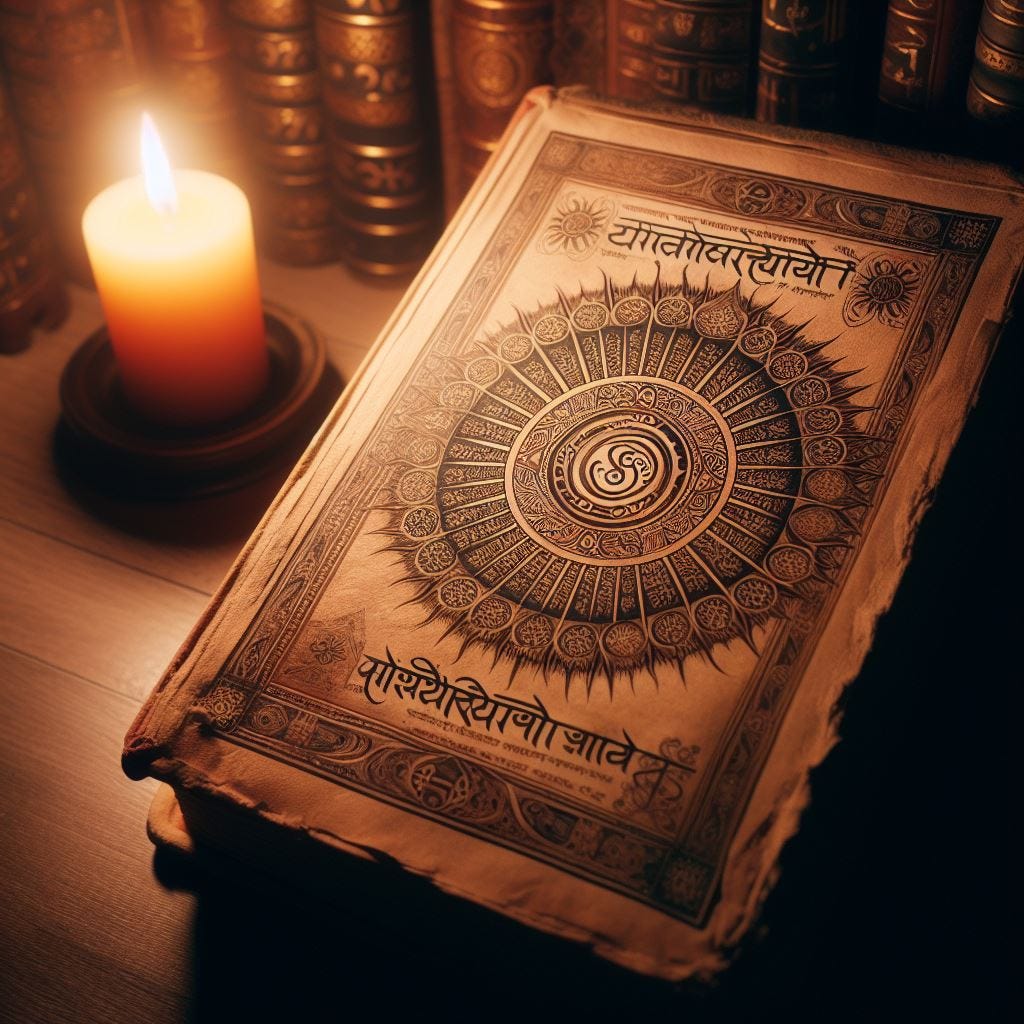Dear friends,
🌟 I hadn't planned on writing a newsletter today, but it seems that inspiration always finds its way to me. Whether it's an incident from the week or a topic I've overheard, I believe that these newsletters are channeled through me rather than created by me.
Today, I bring you another timeless piece of classical text from the Rig Veda called The Nāsadīya Sūkta. 📜
Reason to share The Nāsadīya Sūkta 📜
As humans, our logical nature often leads us to ponder the profound yet existential question of the 'beginning of everything.' This question arises for those who possess the liberty and courage to transcend the confines of need, greed, and religion. Today, I'm here to share a hymn from one of the oldest known texts, the Rig Veda, which addresses this existential question over 7000 years ago. There's nothing necessarily to learn from it, but there's certainly much to contemplate. 🌌
About, The Nāsadīya Sūkta
also known as the Hymn of Creation, stands as the 129th hymn within the 10th mandala of the Rigveda, one of the oldest sacred texts of Hinduism. This profound hymn explores the domain of cosmology, endeavoring to untangle the enigmatic questions concerning the inception of the universe. Opening with the enigmatic declaration, "Then, there was neither existence, nor non-existence," the Nasadiya Sukta engages in contemplative inquiry, posing questions about when, why, and through whom the cosmos came into being.
Rather than providing concrete answers, the hymn adopts a reflective tone, contemplating the uncertainties surrounding the creation of the universe. It presents a philosophical exploration, challenging the listener to ponder the fundamental questions of existence and creation. The verse does not unfold a conventional cosmogony or creation myth, as often found in religious texts; instead, it invites individuals to question whether it is possible to fully comprehend the intricate details of the universe's origins.
The Nāsadīya Sūkta concludes with a thought-provoking notion that even the gods, who emerged after the creation, may not possess complete knowledge of the cosmic genesis. It suggests that the highest celestial surveyor, situated in the heavens, may or may not be privy to the profound mysteries of creation. In this way, the hymn challenges conventional understandings of cosmology and encourages a contemplative exploration of the limitations of human knowledge in the face of the vast and mysterious origins of the universe. The title "Hymn of Creation" in English, while commonly used, might be considered somewhat misleading, as the verse does not present a straightforward creation narrative but rather prompts individuals to reflect on the inherent complexities and uncertainties surrounding the genesis of the cosmos.
The Nāsadīya Sūkta 📜
नासदासीन्नो सदासीत्तदानीं नासीद्रजो नो व्योमा परो यत् |
किमावरीवः कुह कस्य शर्मन्नम्भः किमासीद्गहनं गभीरम् ॥ १॥
Then even non-existence was not there, nor existence,
There was no air then, nor the space beyond it.
What covered it? Where was it? In whose keeping?
Was there then cosmic fluid, in depths unfathomed?
न मृत्युरासीदमृतं न तर्हि न रात्र्या अह्न आसीत्प्रकेतः |
आनीदवातं स्वधया तदेकं तस्माद्धान्यन्न परः किञ्चनास ॥२॥
Then there was neither death nor immortality
nor was there then the torch of night and day.
The One breathed windlessly and self-sustaining.
There was that One then, and there was no other.
तम आसीत्तमसा गूहळमग्रे प्रकेतं सलिलं सर्वाऽइदम् |
तुच्छ्येनाभ्वपिहितं यदासीत्तपसस्तन्महिनाजायतैकम् ॥३॥
At first there was only darkness wrapped in darkness.
All this was only unillumined cosmic water.
That One which came to be, enclosed in nothing,
arose at last, born of the power of knowledge.
कामस्तदग्रे समवर्तताधि मनसो रेतः प्रथमं यदासीत् |
सतो बन्धुमसति निरविन्दन्हृदि प्रतीष्या कवयो मनीषा ॥४॥
In the beginning desire descended on it -
that was the primal seed, born of the mind.
The sages who have searched their hearts with wisdom
know that which is, is kin to that which is not.
तिरश्चीनो विततो रश्मिरेषामधः स्विदासीदुपरि स्विदासीत् |
रेतोधा आसन्महिमान आसन्त्स्वधा अवस्तात्प्रयतिः परस्तात् ॥५॥
And they have stretched their cord across the void,
and know what was above, and what below.
Seminal powers made fertile mighty forces.
Below was strength, and over it was impulse.
को अद्धा वेद क इह प्र वोचत्कुत आजाता कुत इयं विसृष्टिः |
अर्वाग्देवा अस्य विसर्जनेनाथा को वेद यत आबभूव ॥६॥
But, after all, who knows, and who can say
Whence it all came, and how creation happened?
the gods themselves are later than creation,
so who knows truly whence it has arisen?
इयं विसृष्टिर्यत आबभूव यदि वा दधे यदि वा न |
यो अस्याध्यक्षः परमे व्योमन्त्सो अङ्ग वेद यदि वा न वेद ॥७॥
Whence all creation had its origin,
the creator, whether he fashioned it or whether he did not,
the creator, who surveys it all from highest heaven,
he knows — or maybe even he does not know.
Closing Remarks 🌟
It's time to bid adieu for now. I hope this departure leaves you with captivating thoughts and sparks numerous questions, for the journey to answers often begins with questioning.
If you've relished Agama's Message, remember to show your support by liking, sharing, and subscribing. Stay tuned for more from this fantastic and informative newsletter.
Until next time,
Yours truly, Vishal Rajput. 🌟





